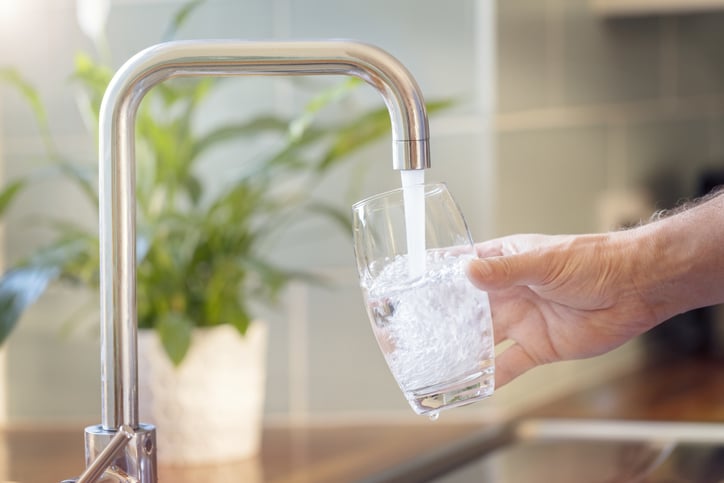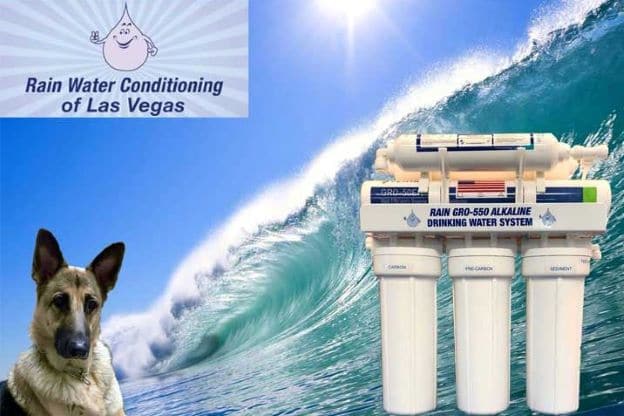
If your water supply has high mineral content and you’re constantly dealing with the damaging effects of hard water, you might be hesitant to drink water directly from your tap. However, does installing a water softener in your home make a difference? Can you drink soft water after it goes through your water softening system? Our Las Vegas water filtration experts explain.
Hard Water vs. Soft Water
Before we get into the drinkability of soft water, let’s quickly talk about what hard and soft water is. Many regions of the United States, including Southern Nevada, supply hard water to residents. This is due to the high mineral content of primarily calcium and magnesium in the water. This sediment is often picked up as the water moves from its main source to the area where it is consumed.
Some common effects of hard water include:
- Chalky white buildup on plumbing fixtures, drains, and appliances
- Laundry is faded and stiff
- Glassware and dishes are left with spots
- Skin and hair feels dry or irritated
- Frequent plumbing repairs
- Stained sinks, toilets, and bathtubs
On the other hand, soft water does not contain these dissolved minerals that can wreak havoc on plumbing fixtures, appliances, hair, and skin. A water softener uses a very effective process of removing minerals using ion exchange. The positively charged ions in minerals are attracted to the negatively charged resin beads in the tank, essentially removing the minerals and allowing soft water to flow into your home.
Is There Sodium in Soft Water?
One common question we often hear is whether softened water contains salt. Some people are concerned that the water coming from their water softener will have sodium in it because water softeners require salt to effectively remove minerals.
It’s true—water softening systems use salt to recharge the resin beads by flushing away the positively charged minerals. However, the amount of sodium that actually enters your softened water supply is very minimal. According to an article published in Very Well Health¹, there is about 12.5mg of sodium in an 8oz glass of softened water, which is considered “very low” by the Food and Drug Administration.
RELATED: Why Do Water Softeners Need Salt?
The Drinkability of Soft Water
There are several things to consider when examining the drinkability of water, including taste and purity. So, can you drink soft water? Although most would agree that soft water from the tap is generally safe to consume, the water is not “filtered” the way you might think. A water softener removes the minerals from hard water but does not provide a filtration system to remove toxins and pollutants from the water.
Are There Health Risks With Drinking Soft Water?
There are no reported health risks to drinking soft water. Although, according to Healthline² and other resources, those with diets that heavily restrict sodium should consult with their healthcare providers on whether the trace amount of sodium in soft water is safe to drink.
However, Rain Water of Las Vegas has designed a patented regeneration system found in all our water softeners! This means you’ll find less sodium in a glass of water softened by a Rain Water system than in a slice of white bread. And if your doctor recommends a sodium-free diet, Rain Water’s reverse osmosis water purification system can reduce the total sodium content in softened water to almost zero.
Learn more about Rain Water’s Reverse Osmosis Purification System! Contact our team today for a free consultation.
How Does Soft Water Taste?
Contrary to what some people may think, soft water does not taste salty! As we mentioned, the amount of sodium found in soft water is minuscule and does not noticeably change the taste of the water. In fact, many people tend to prefer the taste of soft water in coffee, tea, and cooking because it doesn’t have high-mineral content to alter the flavor of whatever you are preparing.
Is Softened Water the Same as Filtered Water?
No, soft water is not the same as filtered water. Soft water just means the minerals have been removed. On the other hand, filtered water has gone through a type of water filtration system designed to remove pollutants, chemicals, and other types of harmful toxins. If you want clean, pure water from every tap in your home, consider installing a reverse osmosis water system or other types of home water filtration systems.
Combine the Benefits of Soft Water and Filtered Water
To get the highest quality water for your family, a combination of a water softener and a water filtration system is the ideal choice. Reverse osmosis purification systems effectively remove sediment, metals, salts, chemicals, chlorine, and other types of contaminants found in tap water.
Some of the reverse osmosis systems found at Rain Water of Las Vegas include:

These purification systems can work together with any water softener to both remove damaging minerals and harmful pollutants found in Las Vegas tap water. To learn more, contact the Rain Water Conditioning of Las Vegas team today!
Call us at (702) 213-9469 now to schedule a free consultation.
Sources:
¹Weber, Craig. (8 October 2021). Water Softeners and High Blood Pressure. Very Well Health. Retrieved 2 November 2021.
²Heathline. (30 July 2019). Hard Water vs. Soft Water: Which One Is Healthier? Retrieved 2 November 2021.
